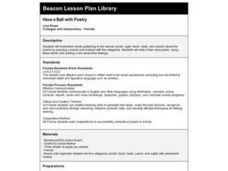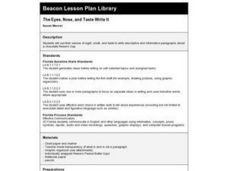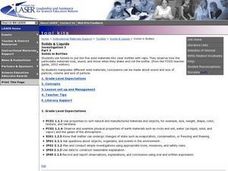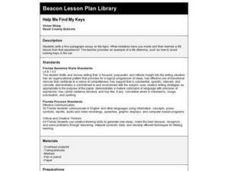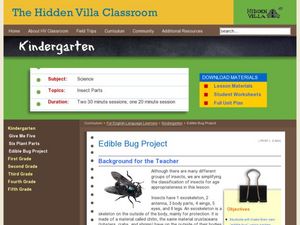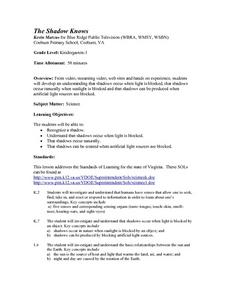Curated OER
Have a Ball with Poetry
Second graders brainstorm words pertaining to the senses about the beach. They write a free verse poem, using these words and adding a line about their feelings.
Curated OER
Outdoor Observation
Students examine their outside environment. They use their senses to make observations of the four seasons. They keep a chart of all of the data they have collected.
Curated OER
Picnics-- Chinese Style
Third graders explore about the Chinese rituals of poetry competition. They compare and contrast Chinese picnics with American picnics. Students create short poems, celebrating their own spring poetry picnic. They discuss words or...
Curated OER
Time Capsule
First graders collect data in the fall and again in the spring. they use the data from both seasons to compare and contrast changes over time. They put the data from the fall into a box or "time capsule." The teacher encourages students...
Curated OER
The Eyes, Nose, and Taste Write It
Third graders generate a list of adjectives about a Reese's Cup using their sense of sight, touch, and taste. Then they write a descriptive paragraph about the Reese's Cup.
Curated OER
Solids in Bottles
Students use funnels to put the five solid materials into clear bottles with caps. They observe how the particulate materials look, sound, and move when they shake and roll the bottle. Finally, students write "sound and touch" poetry.
Curated OER
Modular Houses
Learners, working in pairs, are presented with the problem. They are asked to design modular houses using four cubic modules, all the same size, which touch each other on complete faces. They must draw each of their houses on isometric...
Curated OER
Divulging in Detail
Young scholars rely on their senses to write descriptions of an object within their view. They incorporate different parts of speech in their descriptions. They write a descriptive paragraph about their object.
Curated OER
Help Me Find My Keys
Fourth graders write a five-paragraph essay on the topic: What mistakes have you made and then learned a life activity from that experience?
Curated OER
Using the Correct Vocabulary to Solve Problems
Third graders examine the vocabulary and strategies to be used with addition, subtraction, and multiplication word and story problems. They observe the teacher solve a variety of problems, then write and illustrate their own original...
Curated OER
Conditional Grammar Quiz- Conditional 0, 1, 2, and 3
In this language arts worksheet, students answer 5 multiple choice questions in which they choose a phrase to complete a conditional statement. All sentences have the word "if" and students select the most correct way to end the sentence.
Curated OER
Improving Descriptive Writing: Painting an Original Picture
Descriptive writing is rich in sensory appeals and paints pictures in the minds of readers. Show young writers how to use an on-line thesaurus and a cliché website to create fresh, descriptive writing. The presentation ends with an...
Curated OER
An American Scene Painter
Students study the work of American scene painter Charles Burchfield. In this visual arts lesson plan, students research the nature paintings of Burchfield and then paint their own watercolor scenes in his style.
Curated OER
From Ordinary To Extraordinary Writing
Students investigate the quality of writing while focusing on the use of sensory words to convey meaning and ideas. The power of similes and metaphors is emphasized while they create and edit works of writing. The skill of descriptive...
Curated OER
Chemical Wonders
Learners read about and discuss how chemical engineers use different states of matter to create substances. In this chemical engineering lesson plan, students also give examples of the 3 kinds of matter.
Curated OER
Edible Bug Project
Students recognize the characteristics of insects. In this edible bugs lesson, students observe the body parts of an insect. Students create an edible insect using a grape, carrot sticks and sorrel stems and leaves. Students share the...
Montgomery County Public Schools
Summer Journal Ideas
Twenty prompts, fifteen starters, and ten situations. What more could you ask for from a list of journal ideas?
Loudoun County Public Schools
Figurative Language Packet
A definitive resource for your figurative language unit includes several worksheets and activities to reinforce writing skills. It addresses poetic elements such as simile and metaphor, personification, hyperbole, and idioms, and...
Curated OER
How Do Authors Use Imagery to Shape Their Writing?
Esther Forbes' award-winning Revolutionary War novel, Johnny Tremain and excerpts from Julie Otsuka's When the Emperor Was Divine are used to model how imagery brings alive the setting of a story. The young writers then craft their own...
Houghton Mifflin Harcourt
Songwriting Skill - Elaboration: Jesse McCartney - “How Do You Sleep?”
The practice of developing lyrics by elaborating with sensory details and examples continues in the third lesson on songwriting. This time class members examine Jesse McCartney's "How Do You Sleep?" Using procedures established in the...
Curated OER
Out of the Dust: Background notes about the novel, The Great Depression, and The Dust Bowl
If your class is reading the historical fiction novel, Out of the Dust, then you are in luck. Here are a few slides that will help you provide historical context for the book, as well as define main characters, setting, symbolism, and...
Curated OER
Setting Worksheet
Set your class up for success with writing descriptive settings with these two graphic organizers. On the first page, writers note specifc details about their chosen setting and comment on how each character views the setting. The second...
Curated OER
The Shadow Knows - Creating Shadows
Young learners recognize a shadow and witness how shadows occur when light is blocked. They access streamed video, standard video, and websites in order to engage in their study of how light is naturally blocked to create shadows. An...
Curated OER
Reading Examples
Young writers read excerpts from Gary Paulsen's memoir to identify figurative and literal language that contain sensory details. They determine which selections are examples of sensory language and fi the language is used literally or...


